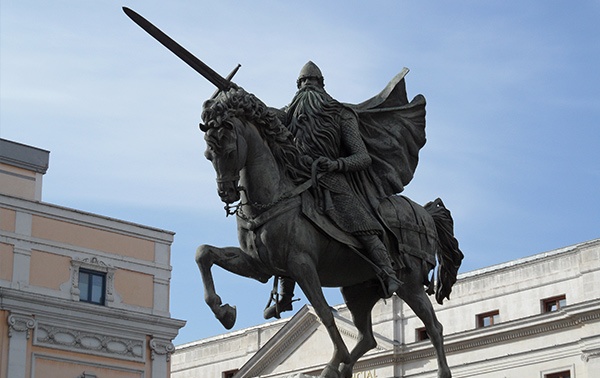CASTILIAN HERO "EL CID": HISTORY AND LEGEND IN THE “CANTAR DE MIO CID”
POEM OF MY CID
The protagonist of this epic poem is the historical Rodrigo Díaz de Vivar (c. 1045-1099), also known as Cid (a dialectal form of the Arabic word sayyid, 'lord' or 'master') and Campeador ('Battler' or 'Victor').

The Cid is Spain's Castilian hero. He has accordingly been seen as the embodiment of the ideals, naturally rather abstract, most valued by each succeeding generation. As a result, there has been a tendency to simplify his character. The epic Cantar de mio Cid, however, shows very little inclination to abstraction. Rather, it portrays a man of his time, admirable in what he does and says, a master of war, of unsurpassed bravery but even more remarkable for his intelligence and his astute judgment, and it offers a direct experience of a world radically different from ours.
The poem begins as the Cid, exiled by the king, leaves his village of Vivar, near Burgos in Castile, on his way into Moorish territory. The Moorish or Arabic-speaking presence in Spain was tremendously influential in the country's history, and is fundamental to the poem. The "moros" dominated Spain after their invasion from North Africa beginning in 711, but by the eleventh century the Christian kingdom of León, toward the northwest of the Peninsula, had become the greatest power, and was exacting yearly tribute from the Moorish kingdoms to the south and east, fragmented but prosperous compared to the north. The Cid of history was a native of Castile, a sometimes rebellious part of the kingdom of León. According to the poem, the Cid was sent by the king to collect tribute money from the Moorish king of Seville. Leonese nobles close to the king convinced him that the Cid had kept much of the money for himself. They are the "enemigos malos" of the poem, and their false accusation led to his exile.
In historical fact, while the Cid was indeed a great warrior hero, exiled not once but twice by king Alfonso VI, the plotting courtiers and the accusation are poetic inventions. To give some sense of the chronology, the first historical exile occurred in 1081; the hero's conquest of Valencia, retold later in the poem, was completed in 1094. After the Cid's death, his memory must have entered oral tradition, assumed poetic form, and evolved over the next century, to be written down in its present form by around 1207.
The departure scene that begins the manuscript is a moving passage and at the same time gives an incisive portrait of the Cid, who as an epic hero represents the values and traits most highly regarded by his society. In these few lines we see a man of deep human feeling, of measured speech, devout, admired and beloved by the people of Burgos, who accept adversity with no hint of resentment against the king. His image will be amplified as the poem progresses, but not in the form of commentary. Rather, the poem presents or displays the hero's character, and relives each scene; the original audience, who were listeners rather than readers, would have experienced it (ideally) as if in the Cid's presence.
DEPARTURE SCENE OF THE POEM
SPANISH ENGLISH
Los ojos de Mío Cid mucho llanto van llorando; From his eyes so sorely weeping,
hacia atrás vuelve la vista y se quedaba mirándolos. he turned his head and was looking at them,
Vio como estaban las puertas abiertas y sin candados, he saw open gates and doors without locks,
vacías quedan las perchas ni con pieles ni con mantos, empty hangers, without furs or mantles
sin halcones de cazar y sin azores mudados. and without falcons or molted goshawks.
Y habló, como siempre habla, tan justo tan mesurado: my Cid spoke well and so measuredly,
"¡Bendito seas, Dios mío, Padre que estás en lo alto! -Thanks to you, Lord, Father who are on high,
Contra mí tramaron esto mis enemigos malvados". this my evil enemies have brought upon me.-
Ya aguijan a los caballos, ya les soltaron las riendas. There they set spur, there they slacken the reins,
Cuando salen de Vivar ven la corneja a la diestra, upon exiting Vivar they saw the crow fly on their right,
pero al ir a entrar en Burgos la llevaban a su izquierda. and upon entering Burgos they saw it on their left.
Movió Mío Cid los hombros y sacudió la cabeza: My Cid shrugged his shoulders and shook his head,
"¡Ánimo, Álvar Fáñez, ánimo, de nuestra tierra nos echan, -¡Good news, Álvar Fáñez, for we are banished from this land!-
pero cargados de honra hemos de volver a ella!"
Ya por la ciudad de Burgos el Cid Ruy Díaz entró. My Cid Ruy Díaz entered Burgos,
Sesenta pendones lleva detrás el Campeador. in his company sixty pennons,
Todos salían a verle, niño, mujer y varón, women and men came out to see him,
a las ventanas de Burgos mucha gente se asomó. burghers, men and women, are at their windows,
¡Cuántos ojos que lloraban de grande que era el dolor! weeping from their eyes, they felt such sorrow,
Y de los labios de todos sale la misma razón: from their mouths all said one thing,
"¡Qué buen vasallo sería si tuviese buen señor!" -¡God, what a good vassal, if he had a good lord!-
Source:
http://miocid.wlu.edu/